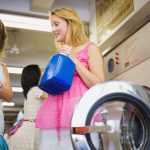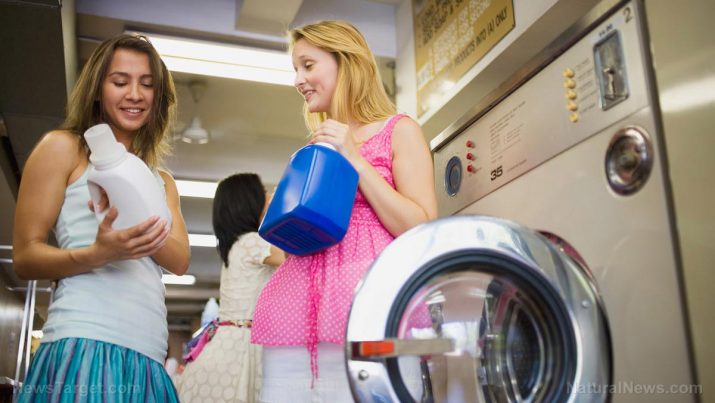
Appealing to the dumbed-down masses, Procter & Gamble will use Millennial grunts like “LOL” and “WTF” on its toxic detergent products
Tuesday, August 28, 2018 by Tracey Watson
http://www.products.news/2018-08-28-proctor-gamble-will-use-millennial-grunts-like-lol-and-wtf-on-its-toxic-detergent-products.html

It would seem that in addition to living in their parents’ basements, Millennials don’t do their own laundry. Convinced that it is possible to move this generation of consumers to action simply by including Millennial grunts like “LOL” and “WTF” on its product packaging, Procter & Gamble (P&G) is trying to get these slang words trademarked so that they can use them to lure the most useless generation in history to use their detergents and other cleaning materials.
P&G is the world’s largest consumer products company, and owns Tide, Febreze and Mr. Clean, among others. The cleaning giant sees Millennials as a lucrative market just waiting to be tapped into; apparently P&G executives remain convinced that Millennials can be stirred to action by something as simple as pithy advertising and the use of the right type of slang.
“Millennial friendly acronyms”
According to CNBC, P&G has applied to the U.S. Patent and Trademark office to use four acronyms especially popular with Millennials on its products:
- LOL: Laughing out loud
- WTF: What the f***
- NBD: No big deal
- FML: F*** my life
The company wants the right to use these terms, which are commonly used on social media and messaging apps, on its dish washing detergents, liquid soaps, air fresheners and surface cleaning products.
P&G has also applied for a trademark on the term “Home Made Simple” for use on some of its product lines.
Activist investor (whatever that means) Nelson Peltz, a board member with P&G, believes that Millennials are choosy when it comes to brand selection and are attracted to niche products rather than “one-size fits all” type items.
“Millennials want these little brands, these local brands that they have an emotional attachment to,” he told CNBC.
In other words: Their toys need to look shiny, special and different, or they don’t want to play. How using popular acronyms on massively popular household brands like Tide and Febreze will convince these consumers that they’re actually “little brands” is hard to imagine, however.
Chemicals by any other name …
Nonetheless, irrespective of how these products are marketed, Millennials and other consumers do well to recognize that the cleaning materials sold by P&G and other similar companies are toxic and over time are absorbed through the skin, causing liver toxicity, cancer, nervous system disorders and other problems.
Mike Adams, the Health Ranger and founder/editor of Natural News warned:
[T]he laundry room is also highly toxic, containing the same chemical perfumes [as those found in popular perfumes and colognes] in both the laundry detergent and especially the dryer sheets. Dryer sheets coat all your clothes with a layer of toxic chemicals. When you wear those clothes, your body moisture causes those chemicals to come into contact with your skin and be absorbed directly into your bloodstream. It’s an easy way to poison your system with cancer-causing chemicals.
The fact is, no matter how much those chemicals might smell like fresh mountain air or flowers, wearing clothes washed with these detergents is like wrapping ourselves in a “toxic blanket of chemicals.” They take the dirt out of your clothing, it’s true, but leave behind toxic residue invisible to the human eye, but no less dangerous for being invisible.
Some of the toxic chemicals commonly found in laundry detergents include:
Phenols: These easily absorbed chemicals are toxic to the liver, heart, lungs and kidneys, have been linked to serious health problems, and can cause death.
Optical brighteners: This popular ingredient tricks the human eye into thinking that clothes look whiter than they really do. Studies have found that they are highly allergenic when exposed to sunlight and cause mutations in bacteria.
Bleach: Sodium hypochlorite (bleach) is a strong irritant to the eyes and skin and one of the leading causes of poisoning in the home.
So, no matter what catchy phrases and acronyms the chemical giants start using to lure younger consumers, Millennials would do well to resist the temptation to start using these dangerous, toxic products. That doesn’t mean they shouldn’t get off the couch and start doing laundry; they should just switch to safer, chemical-free products.
See more examples of hilarious or stupid news at ROFL.news.
Sources include:
Tagged Under: Tags: acronyms, chemicals, cleaning materials, dangerous chemicals, disease causes, FML, laundry detergent, left cult, LOL, millennials, NBD, P&G, prevent disease, Procter & Gamble, products, Social media, stupid, toxic ingredients, virtue signaling, WTF





